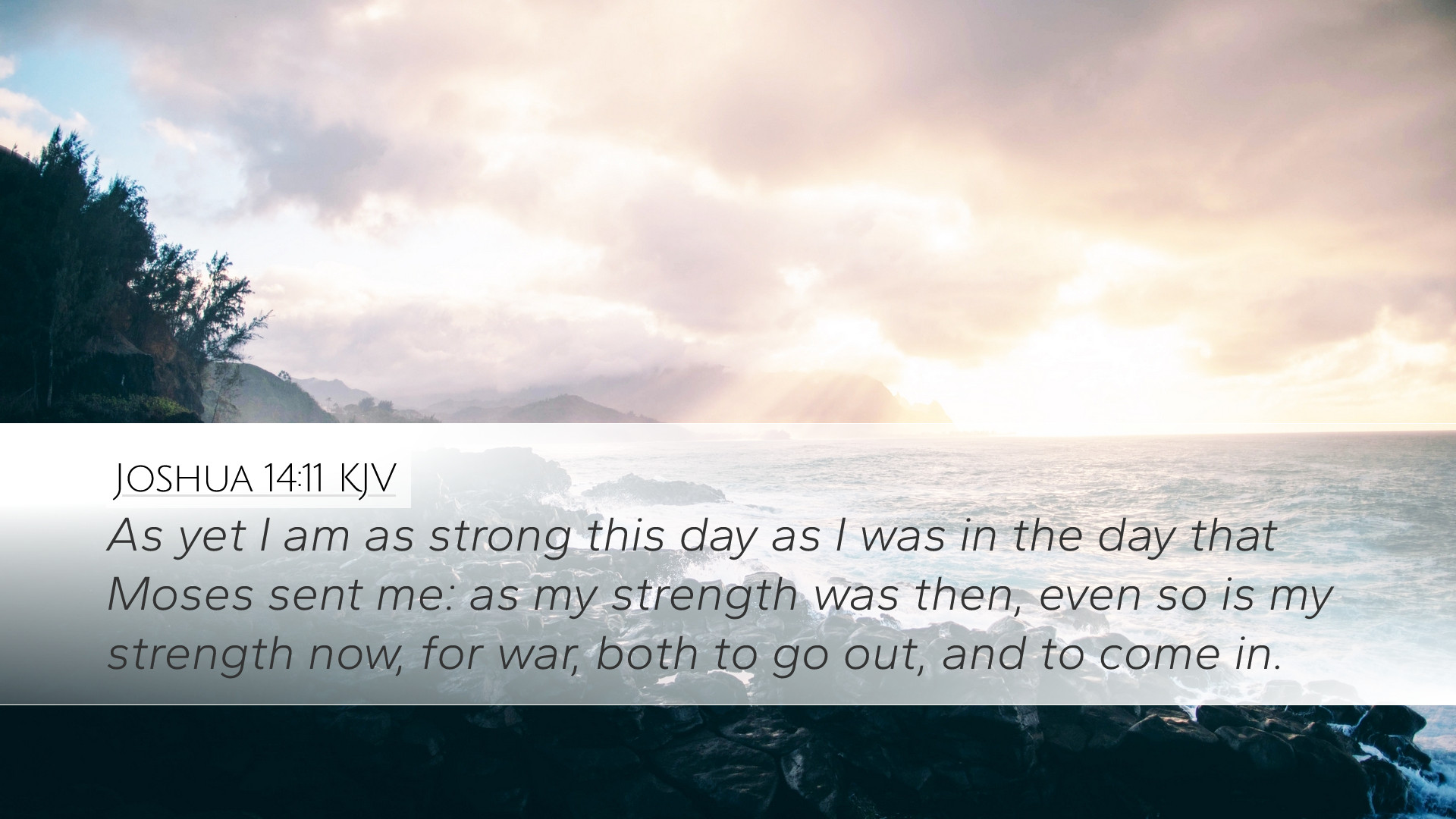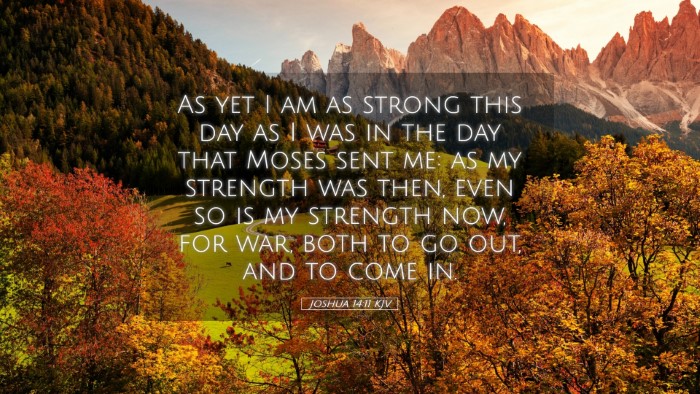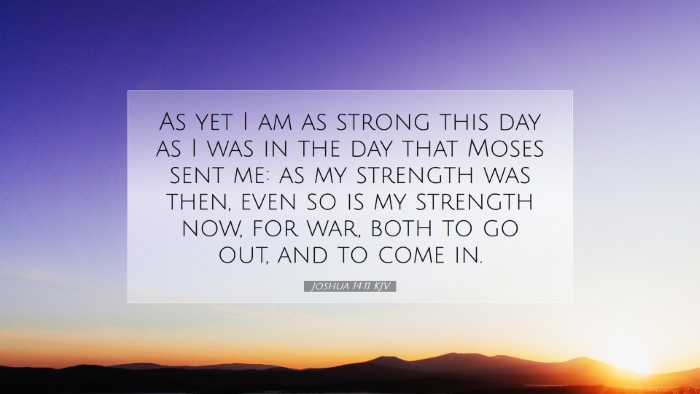Old Testament
Genesis Exodus Leviticus Numbers Deuteronomy Joshua Judges Ruth 1 Samuel 2 Samuel 1 Kings 2 Kings 1 Chronicles 2 Chronicles Ezra Nehemiah Esther Job Psalms Proverbs Ecclesiastes Song of Solomon Isaiah Jeremiah Lamentations Ezekiel Daniel Hosea Joel Amos Obadiah Jonah Micah Nahum Habakkuk Zephaniah Haggai Zechariah MalachiJoshua 14:11
Joshua 14:11 KJV
As yet I am as strong this day as I was in the day that Moses sent me: as my strength was then, even so is my strength now, for war, both to go out, and to come in.
Joshua 14:11 Bible Commentary
Commentary on Joshua 14:11
Verse: Joshua 14:11 - "I am yet as strong this day as I was in the day that Moses sent me: as my strength was then, even so is my strength now, for war, both to go out, and to come in."
Introduction
This verse is part of a larger narrative concerning Caleb, one of the twelve spies sent to scout the land of Canaan. His declaration at the age of eighty-five encapsulates his faithfulness to God and his unwavering strength, which serves as an example for believers. In examining this verse through the lens of public domain commentaries, we discover significant insights into Caleb's character, his relationship with God, and the implications for Christians today.
Exegesis and Analysis
The phrase "I am yet as strong" not only highlights Caleb’s physical strength but also symbolizes his spiritual vigor. The original context of this statement arises as he claims his inheritance of the land promised by God through Moses. This act of claiming reflects not just physical capability, but unwavering faith in God’s promises.
Caleb’s Assurance of Strength
Matthew Henry notes that Caleb's confidence in his strength at an advanced age is remarkable. He attributes it to the Lord's enabling power. Henry emphasizes the connection between spiritual vitality and physical capability, suggesting that when one's heart is aligned with God, the believer is equipped to accomplish great tasks regardless of age.
Faithfulness Over Time
Albert Barnes elaborates on how Caleb's endurance and persistence serve as a testament to his character. He reminisces about the strength he exhibited when sent as a spy and how that same strength is present in him even decades later. Barnes stresses the importance of remembering God's past faithfulness to bolster present strength. For pastors and theologians, this suggests encouraging believers to reflect on their spiritual journeys for renewal of strength.
Spiritual Parallel
Adam Clarke draws a parallel between Caleb's physical battles and the spiritual battles Christians face. Clarke interprets the words "for war" not just in a literal sense but also in a metaphorical sense of spiritual warfare. He reminds the reader that as Caleb remained prepared to fight physically, so too must Christians remain vigilant and equipped to face the spiritual challenges in their lives, referencing Ephesians 6:10-18 on the armor of God.
Lessons from Caleb
- Age is Not a Barrier: Each of the commentaries emphasizes that age should not deter anyone from undertaking God's work. Caleb’s confidence at eighty-five years old serves as a strong reminder that God can use any individual, regardless of age.
- Faith in God’s Promises: All three commentators emphasize Caleb’s unwavering faith in God’s promises. His strength came not just from physical ability but from confidence in God's provision.
- Endurance in Faith: The consistency of Caleb’s faith over decades challenges believers to remain steadfast in their commitments to God throughout their lives.
- Equipping for Battle: Clarke’s insights on spiritual preparedness continue to be pertinent today. Caleb’s readiness for war reflects the Christian call to be spiritually equipped for the challenges faced in life.
Theological Implications
The theological significance of Joshua 14:11 draws attention to God’s faithfulness across generations. Caleb’s life reflects the continual covenant relationship between God and His people, showcasing how individual faith can influence community legacy.
Matthew Henry suggests that Caleb’s example should encourage others to look back on God’s promises, nurturing a spirit of gratitude as well as a zeal for future endeavors. It raises important questions for theological reflection on how personal experiences of faith can inform the collective understanding of God's character in a community setting.
Conclusion
In conclusion, Joshua 14:11 serves as a rich source for believers seeking to enhance their understanding of faith, strength, and divine promise. The insights from Henry, Barnes, and Clarke resonate deeply, inviting pastors, students, and theologians to consider how Caleb’s unwavering faith in his later years can serve as a dynamic model for contemporary believers. As one reflects on his life and declaration, the reminder is clear: God’s strength is available, and His promises endure across all stages of life. Let Caleb’s confidence in God's provision encourage a new generation to strive toward the promises God makes to His people.


